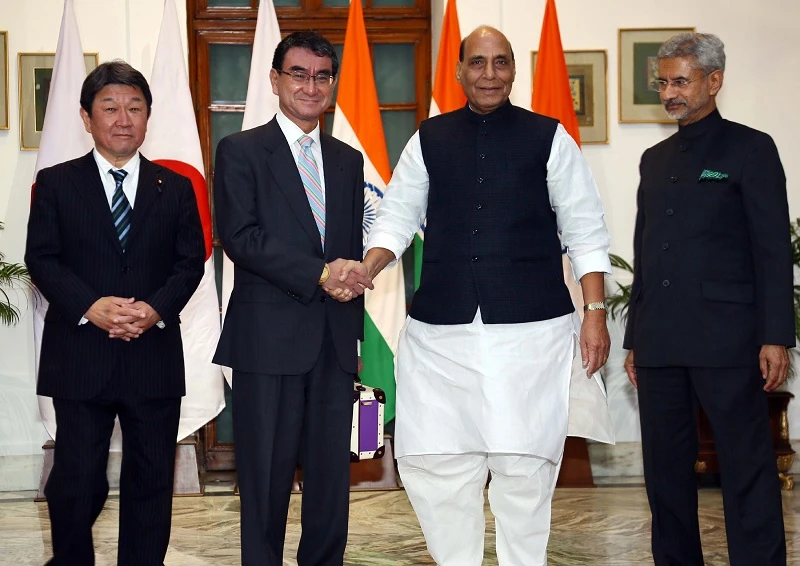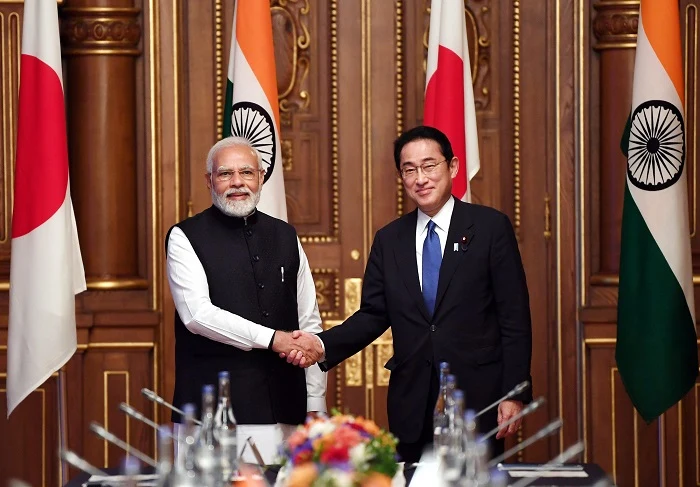Talks on ways to tackle the growing Chinese assertion – from Eastern Ladakh to the Senkaku Islands – could dominate the second India-Japan 2+2 Ministerial Meeting which will be held in Tokyo on September 8.
The security concerns from the Himalayas to the Indo-Pacific are expected to feature prominently when Defence Minister Rajnath Singh and External Affairs Minister S Jaishankar meet their respective Japanese counterparts Yasukazu Hamada and Yoshimasa Hayashi on Thursday.
The meeting comes at a time when Japan-China relations are facing various difficulties and Tokyo has admitted that the public opinion against China in Japan is “extremely severe”.
Japan has repeatedly not only mentioned the importance of peace and stability in the Taiwan Strait but also expressed serious concern about the situation in the East China Sea, South China Sea, Hong Kong, Xinjiang Uyghur Autonomous Region and the Senkaku Islands.
Thousand of miles away, India is locked in a prolonged border standoff at the LAC with China and, while asserting that the relationship with Beijing cannot be a one-way street, made it clear that it won’t be giving any concessions.
“Through these opportunities, opinions will be exchanged on strategic relations between the two countries, including collaboration on regional and international issues and security and defence cooperation, toward the realization of a ‘free and open’ Indo-Pacific,” the Japanese Foreign Ministry said today in a statement on the forthcoming 2+2 meeting.
Both countries, along with Quad partners the United States and Australia, are also increasing practical cooperation as Keiichi Ichikawa, Director-General of Japan’s Foreign Policy Bureau attends the Japan-US-Australia-India Senior Officials’ Meeting in Delhi today.
At the same time, Ely Ratner, the US Assistant Secretary of Defence for Indo-Pacific Security Affairs, will also be in the Indian capital to deepen Washington’s cooperation with each of the key Indo-Pacific partners.
On Thursday in Tokyo, Singh will also hold the Defence Ministerial Meeting with his Japanese counterpart following which the 14th Japan-India Foreign Ministers’ Strategic Dialogue will take place between Jaishankar and Yoshimasa Hayashi.
India reiterated today that the Special Strategic and Global Partnership between the two countries is based on shared values of democracy, freedom and respect for rule of law.
“During the visit, the two sides will further explore new initiatives to strengthen the partnership,” said the Ministry of External Affairs.
Both countries have remained focused on the situation in the Indo-Pacific region and their respective efforts under India’s ‘Act East Policy’ and Japan’s ‘Free and Open Indo-Pacific Vision’ for achieving their shared objective of peace, prosperity and progress to realize a better future for the people of the two countries and the region.

Much water has flown under the bridges of Tokyo since the inaugural meeting of the India-Japan Foreign and Defence Ministerial Dialogue (2+2) was held on November 30, 2019, in New Delhi.
Not only has the Covid-19 pandemic changed the world but geopolitical rivalry and conflict have brought in significant changes – from Ukraine to the South China Sea and beyond.
During the 2019 discussions, Japan was represented by Motegi Toshimitsu and Kono Taro who held the foreign and defence ministry portfolios, respectively in the government led by late Prime Minister Shinzo Abe.
However, during all these years and trying circumstances, the commitment between New Delhi and Tokyo to further deepen the bilateral security and defence cooperation – as envisaged by Prime Minister Narendra Modi and Abe during the 13th India-Japan Annual Summit held in Japan in October 2018 – has only grown stronger.
This year, in particular, has witnessed a high level of engagement between the two countries as Japanese Prime Minister Fumio Kishida visited India in March and then PM Modi travelled to Tokyo for the Quad Summit and held further discussions on advancing the bilateral cooperation agenda.
“Closer India-Japan cooperation is vital in the post-Covid world. Our nations are firmly committed to democratic values. Together, we are key pillars of a stable and secure Indo-Pacific region. I am equally glad that we are working closely in various multilateral forums as well,” said the Prime Minister.
Also Read: India steps up diplomacy to buy oil from the Russian Far East




















